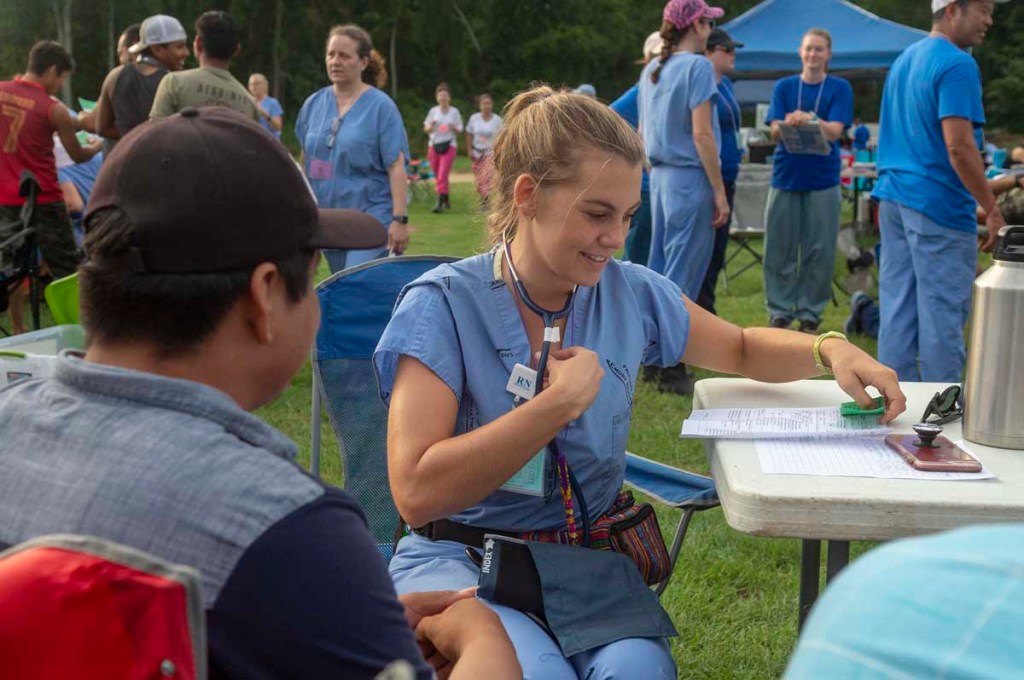UPDATE: Coronavirus cancels farmworker health outreach
Published 5:26 pm Wednesday, May 27, 2020

- 2019 Georgia State University Perimeter College Dental Hygiene grads and Atlanta campus Physical Therapy students providing services to Migrant workers and their families.
Editor’s note: The following story has been changed from its original version to correct the names of the sponsors and partners of the farmworker health outreach.
MOULTRIE, Ga. – Agriculture is a large deal in South Georgia, and its economy is suffering in the wake of the COVID-19 pandemic, affecting farmworkers all over.
The Ellenton Migrant Clinic and Georgia Public Health District 8-2 hold a Farmworker Family Health Program every summer in June, administered by the Nell Hodgson Woodruff School of Nursing at Emory University and partners Georgia State University and the University of Georgia. Students from those institutions’ schools of nursing, pharmaceutical studies, physical therapy and dental hygiene spend two weeks delivering health care to farmworkers and their families in South Georgia.
In addition to the universities, partners include the Colquitt County Health Department, the Colquitt County Board of Education, the Southern Pine Migrant Education Agency (Georgia Department of Education), SOWEGA and SPCC AHECs, and the owners of farms and packing houses in the Colquitt County area.
Each year, between 600 and 800 farmworkers and their families are given healthcare service through this program.
But not this year. Due to the coronavirus pandemic, the program this year has been canceled.
Still, even with the program canceled, the Georgia Department of Public Health Southwest Health District 8-2 is doing all that it can to help farmworkers manage their health during the crisis. Ellenton Farmworker Clinic was assisting farmworkers even before the pandemic began, and now with production ramping up, its staff is starting to see large numbers of farmworkers on their doorstep.
“With the busy growing season ahead, time for peak numbers of farm workers in Colquitt County is just beginning,” said Public Information Officer Karen Snyder of the Georgia Department of Public Health. “We have done a lot of work educating farm owners and workers about COVID-19 and have referred some patients for testing at the Augusta University testing site at Colquitt Regional. We are in discussions about the possibility of a Public Health specimen collection site in a rural area near farming operations in the future.”
Financially, the virus has affected farmers as well — especially in produce — but seemingly in different ways, according to University of Georgia Colquitt County Extension Coordinator Jeremy Kichler.
“There aren’t any hard-economic numbers out yet, at least as far as the university has gathered,” Kichler said. “On the vegetable side of things there were some marketing issues. A couple months ago when the pandemic started, we started talking to growers; there’s more concern about the employees, especially the H2A workers. Vegetables are moving pretty well now, and the Florida production season is winding down. One thing for sure with the virus, it definitely shows how fragile our economy really is.”
“It’s affected people differently,” he said. “When all the schools closed down, that affected producers on the farming level. They market their vegetables in different ways. Some folks sell cabbage for cole slaw to restaurants, for example. When those restaurants closed down, that was a big part of the farm’s marketing. One of the local strawberry patches was concerned about schools closing down because they send strawberries to different school systems. But when everyone was in quarantine, everyone came out to the U-Pick strawberry patch and picked strawberries.”
One of the local producers, Ochlockonee Ridge Farms, has seen both sides of the coin: seeing the virus ravage their wholesale business but managing to stay afloat with a U-Pick business on the side.
“Normally, we do a lot of wholesale business with the local school systems, but with schools shutting down, we lost all of our wholesale. It was very fortunate for us, our other business, the U-Pick has helped to offset the losses brought on by the wholesale,” said Trey Hart of Ochlockonee Ridge Farms.
“Most of the business has been wholesale to schools,” Hart said. “When you start a wholesale business, you need a good location and about 80,000 people to cater wholesale to a county. We learned really quick that we didn’t have enough people in Colquitt County to sustain a traditional U-Pick, so that’s how we started wholesale. We did get more U-Pick business this year because we’re essentially an outdoor grocery store. Because people were bored and looking for something to do during the quarantine, that really helped to offset some of our losses.”
“We normally have four workers to help us during the production season, but we had to quit with the picked berries for wholesale about a month into the pandemic and rely on the U-Pick instead. We’ve been dealing with more people than we normally have, but people did a good job of following most of the guidelines. We were fortunate that we could offset some of our losses because of our U-Pick business and most wholesalers didn’t have that option. I truly appreciate Colquitt County and all it’s done for us this year,” said Hart.





